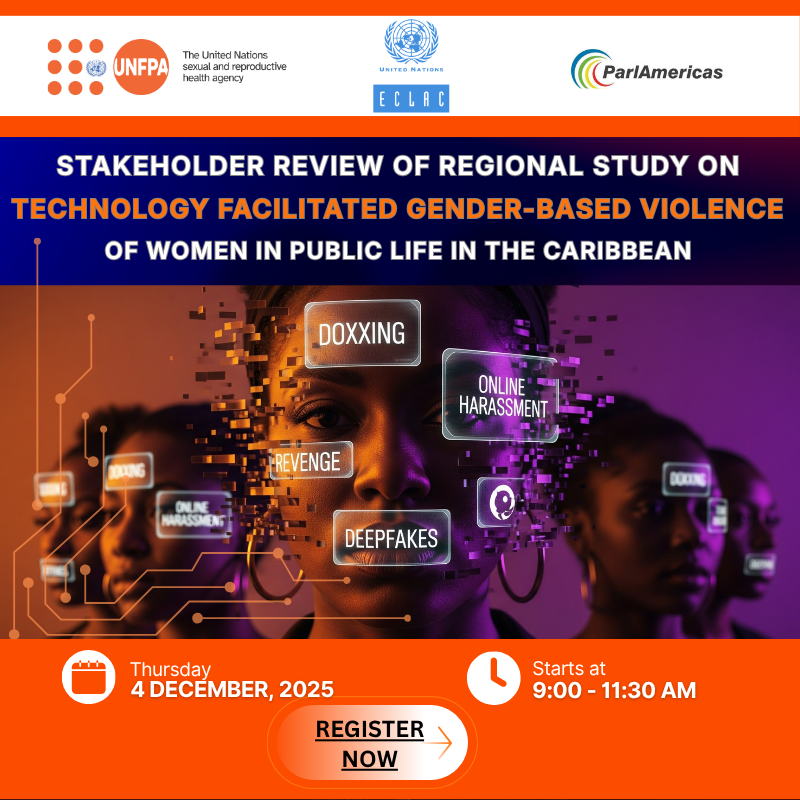Stakeholder review of regional study on Technology-Facilitated Gender-based Violence (TFGBV) against women in public life
Work area(s)
Teaser
Regional Dialogue to present and discuss the findings of Caribbean study on TFGBV and develop advocacy strategy, through high-level knowledge sharing, for safer digital spaces for all.
Event information

Data
4 Dez 2025, 09:00 - 13:00Event type
Participation
Study Title
Catalysing Regional Action on Technology-Facilitated Gender-Based Violence Against Women in Public Life
Purpose
This study explores how women in public life (parliamentarians, journalists, activists, etc.) in the Caribbean experience technology-facilitated gender-based violence (TFGBV). The findings will inform regional advocacy, legal reform, and protection measures.
Background & Context
Technology-facilitated gender-based violence (TFGBV) has become a growing threat to women’s rights, safety and public participation. Globally, evidence shows that women in public life—particularly parliamentarians, journalists, activists, and other public-facing figures—face targeted and sustained abuse online. According to UNESCO’s The Chilling report (2021), nearly three-quarters of women journalists experienced online violence, with severe mental health, safety, and professional impacts. Women parliamentarians and those in the public sphere face similar targeting, undermining participation and gender equality gains.
In the Caribbean, while anecdotal evidence and media reports suggest that women in politics and media routinely face online abuse - including sexualized threats, doxxing, cyber-harassment, and image-base abuse - there is currently no region-specific research or systemic data that captures the prevalence, patterns, and impacts of this growing phenomenon, exacerbated by small population dynamics and high social media penetration. Traditional interventions focus on offline violence or general GBV - this gap constrains effective policy and programming responses not only for this population but for all women and children.
This joint initiative between UNFPA Caribbean Sub-Regional Office and the Economic Commission for Latin America and the Caribbean (ECLAC), Subregional Headquarters for the Caribbean, will be the first regional study focusing on TFGBV targeting women parliamentarians and women in media across the 22 Caribbean territories covered by UNFPA. The effort will also explore possible collaboration with ParlAmericas, leveraging their engagement with Caribbean legislatures.
The initiative strategically aligns with:
● The Global Digital Compact, and its principle of gender equality and the empowerment of all women and girls and their full, equal and meaningful participation in the digital space,
● UNFPA’s bodily autonomy and gender equality mandate,
● ECLAC’s focus on advancing women’s participation in governance and the economy,
● The Digital Agenda for Latin America and the Caribbean (eLAC2026), and its aim to incorporate a gender perspective in digital transformation strategies, and
● ParlAmericas’ work on building safe, inclusive, and violence-free digital spaces.
Subregional headquarter(s) and office(s)
Attachment(s)
Related link(s)
Organizing institution
ECLAC Subregional Headquarters for the Caribbean
- http://www.cepal.org/en/headquarters-and-offices/eclac-caribbean
- (868)224-8000